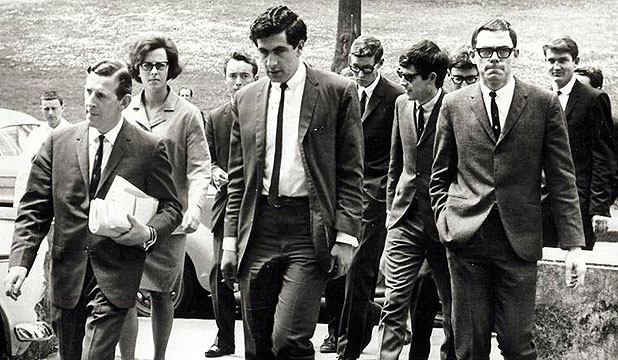
Dreams of launching pirate radio in Auckland made a breakthrough once the station was able to be broadcast out on the water.
“The key moment was getting a boat,” explains David Gapes, one of a group of men in their 20s who, in 1966, defied the New Zealand government and launched a pirate radio station in Auckland’s Hauraki Gulf.
“It wasn’t real until we actually got our mitts on a boat. Then we realised we could do it.”
The boat David is referring to is the Tiri – later replaced by Tiri II after the original ran aground on Great Barrier Island – which in December 1966 became the broadcast base of operations for the ground-breaking Radio Hauraki.
Fittingly enough, the first song the radio station played was Born Free.
Over the next three and a half years this small group of people would experience all manner of highs, lows, triumphs and even tragedy – but they would also clear the way for privately run commercial radio.
It is a story begging to be told – and while that story hit the big screen this year in the form of the drama 3 Mile Limit, it is also getting the Sunday Theatre TV treatment with the docu-drama Pirates Of The Airwaves.
David says he does not know why the tale is being retold now – just a couple of years shy of the station’s 50th anniversary.
“It has always bubbled along as a potential film subject, ever since it happened. Over the years I’ve been interviewed by lots of would-be producers for movie versions, so it was inevitable that one or two of them would come through and these both happened about the same time.
“But they’re both very different projects – one is based on fact but loosely fictional, and the other one is a docu-drama, so factual.”
Asked what his single most vivid memory of that turbulent time was, David, a journalist, struggles to pick just one.
“There were a lot, but I guess the obvious one is hearing the bloody thing on the air at last, from the comfort of my Orakei living room. Bang – there it was on the radio. That was pretty extraordinary. There were a lot of highlights, and quite a few lowlights too.”
Speaking of lowlights, one of the challenges Radio Hauraki faced in the early days was the wild weather in the Hauraki Gulf – weather which would result in them running aground several times.
“Yeah, it ran aground three times,” remembers David. “I was on board once – actually, it didn’t run aground then, it got smashed at the wharf on Great Barrier Island by a bad storm.
“I was on board then, when the mast came down and all that… That was a pretty hairy business.”
“Pretty hairy” barely seems to cover it. By the sounds of it, the undertaking was fraught with peril – physical, financial and mental.
“Obviously I was acutely aware of the dangers,” says David. “I was in a state of terror every day that something would go wrong.
“But luck stayed with us – right until the last day,” he adds, bitterness inherent in his voice as he recalls the death of announcer Rick Grant, lost overboard during Tiri II’s final voyage home in June 1970.
Ad Feedback
“Would I have done anything differently Hell yes – if I knew what I know now, well, I wouldn’t have done it, because a friend got killed. But things don’t work that way.
“It was clear from the start it was a risky business, and that there was always danger involved, but we were all young. The fire was in our blood.”
Pirates Of The Airways (Sunday Theatre)
TV1
Sunday July 27
-TV Guide